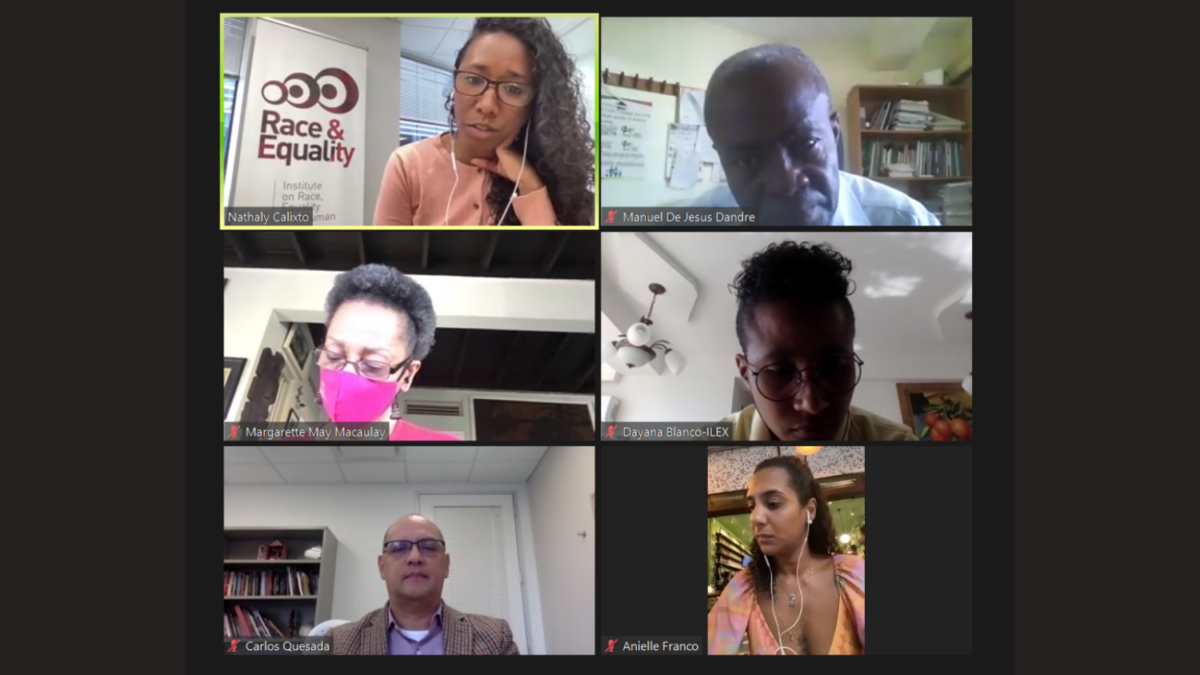Specialists and activists call for the activation of the Inter-American Committee for the Prevention and Elimination of Racism, Racial Discrimination, and All Forms of Discrimination and Intolerance
Washington D.C., March 29, 2022.- Specialists and activists from Latin America and the Caribbean called for the activation of the Inter-American Committee for the Prevention and Elimination of Racism, Racial […]

Washington D.C., March 29, 2022.- Specialists and activists from Latin America and the Caribbean called for the activation of the Inter-American Committee for the Prevention and Elimination of Racism, Racial Discrimination and All Forms of Discrimination and intolerance. In order for the Committee to be activated, at least ten member states of the Organization of American States (OAS) must ratify the Inter-American Convention against Racism, Racial Discrimination, and Related Forms of Intolerance (CIRDI).
This call for activation of the Committee took place during a webinar organized by the Institute on Race, Equality and Human Rights (Race and Equality)—with the support of the Inter-American Commission on Human Rights (IACHR)—in commemoration of the International Day for the Elimination of Racial Discrimination. The event had the participation of Commissioner Margarette May Macaulay, Rapporteur on the Rights of People of African Descent and Against Racial Discrimination, of the IACHR; Dayana Blanco, Executive Director of Ilex Acción Juridica, of Colombia; Aniella Franco, Executive Director of the Marielle Franco Institute, of Brazil, and Manuel de Jesús Dandre, Executive Director of the Jacques Viau Network, of the Dominican Republic.
On behalf of Race and Equality, the Executive Director, Carlos Quesada, and the Brazil Program Officer, Nathaly Calixto, participated. Ms. Calixto served as moderator. In his welcoming remarks, Mr. Quesada highlighted the fact that the Americas have tools such as the CIRDI to combat racism and racial discrimination, although he also recalled that to date, this Convention has only been ratified by six OAS countries and that, according to its article 15, it is necessary for ten countries to ratify it so that the Inter-American Committee for the Prevention and Elimination of Racism, Racial Discrimination and All Forms of Discrimination and Intolerance can be created.
Likewise, he drew attention to the situation of violence and discrimination faced by Afro-LGBT people in countries such as Brazil, Colombia, and the Dominican Republic. In the case of Brazil, he explained that the ANTRA organization documented that in 2019 there were 124 murders of trans people, of which 75% were Afro-descendants. Quesada emphasized that mechanisms established several years ago should be used, such as the International Convention on the Elimination of All Forms of Racial Discrimination (ICERD), and recently created mechanisms, such as the United Nations Permanent Forum for Afro-descendants.
Structural transformation
The Executive Director of Ilex Acción Jurídica, Dayana Blanco, referred to the need for the content and scope of the CIRDI to be disseminated among Colombian society and organizations, in order to learn how this instrument can contribute to the fight against racism and racial discrimination, and how it differs from the regulations on this matter that are already part of Colombian legislation. The activist emphasized that the Law is not the only way to transform societies, for which she also highlighted the importance of implementing educational strategies aimed at the various sectors that comprise them.
Recognition and identity
From the Dominican Republic, the Executive Director of the Jacques Viau Network, Manuel de Jesús Dandre, praised the importance of the Inter-American Convention against Racism and the Committee for the development of educational processes on ethnicity and race, saying that in this eminently Afro-descendant country, only 8% of the population is recognized as such. In addition, he expressed his concern that the State does not recognize racism and racial discrimination as latent problems in Dominican society.
Fight against racist police violence
Anielle Franco, Executive Director of the Marielle Franco Institute, from Brazil, referred to the problem of racist police violence in this country, alluding to the case of the young woman Kathlen Romeu, who died in June 2021 as a result of a stray bullet when she was 13 weeks pregnant in a Military Police operation in a favela in Rio de Janeiro. “Police violence has cut off our dreams. Since we were little, we experience in our skin the sensation of always wanting to flee from the presence of the police, from stray bullets,” said the activist, pointing out the need to articulate actions to activate the Committee and other spaces to combat racism and racial discrimination.
Commitment for 2022
Commissioner Margarette May Macaulay, Rapporteur on the Rights of People of African Descent and against Racial Discrimination, of the IACHR, also recognized the impact that racism and racial discrimination have on the integrity and quality of life of people of African descent, to the point that she assured that in Brazil there is a “racial genocide”. For this reason, she pointed out that it is urgent that during 2022 we achieve the ten ratifications that would allow the activation of the Inter-American Committee for the Prevention and Elimination of Racism, Racial Discrimination and All Forms of Discrimination and Intolerance.
Race and Equality recognizes and appreciates the contributions of the specialists and activists who participated in this event and joins the call to combine efforts to achieve the creation of the aforementioned Committee, as a regional mechanism to combat racism and racial discrimination in the Americas. We firmly believe in the principles and mandates of the Inter-American Convention against Racism, so from our CIRDI 2024 campaign “Towards a region free of racial discrimination” we will continue working hand in hand with civil society to pressure the States for their signature, ratification, and effective implementation.

